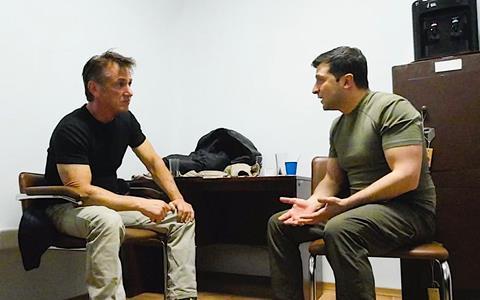’Frenetically-paced, awkwardly narcissistic’: Sean Penn and Aaron Kaufman present their account of the war in Ukraine

Dir. Sean Penn, Aaron Kaufman. USA. 2023. 123mins
Of all the facts emerging from the last momentous year in Ukraine, one of the least interesting – with all due respect – must be the presence of Sean Penn there. If only someone had told Penn and his co-director Aaron Kaufman. Undeniably well-meaning and impassioned about the country, its people and its struggle, documentary Superpower is a cluttered account of the war so far, the facts distractingly filtered through the dominant idea that the Hollywood actor is there on the ground, filming history as it happens.
Its insights are bound to be superseded by many more focused documentary accounts
Given how much informative, sober coverage the war has so far generated, it’s hard to imagine that viewers will really benefit from this frenetically-paced, awkwardly narcissistic piece. Superpower seems unlikely to create many ripples following its appearance in the Berlinale Special strand, with its insights bound to be superseded by many more focused documentary accounts in the years ahead.
Penn and Kaufman started filming in Ukraine in late 2021, some time before the war broke out, and Superpower is pitched at the start as Penn’s account of how he came to embark on this journey of discovery, as the narrative inescapably frames it. Throughout the documentary – which mixes the film-makers’ own footage with material culled from assorted sources, including Ukrainian, Russian and western news outlets – there is some reasonably solid recounting of the facts - for example, a brief run-through of the Maidan demonstrations of 2013-14 that unseated president Viktor Yanukovych and cemented the idea of Ukrainian national identity and independence from Russia. But all this has been well covered elsewhere, and Superpower’s breakneck pace and fragmented style make it hard to absorb its dense information in any useful way.
The film’s title is explained by a concluding excerpt from the Ukrainian TV comedy series Servant Of The People, in which Zelensky, then a leading actor-comedian, played a regular guy who became Ukraine’s president. In the sequence, Zelensky’s character tells his young son that the superpower which enables him to fight is his love for the kid – and this sentimental ‘father of the people’ note underlies the whole film. But this is perhaps not unjustified, given the adoration and respect there is for Zelensky, at home and internationally, deriving not least from his staunch refusal to flee Kyiv when war broke out.
One of the most interesting points the film has to make is that, at the time of his election, Zelensky was not universally adored in Ukraine, and that some suspicion surrounded him as a showbiz figure (not only an entertainer, but a powerful producer) venturing into politics. At the end of Superpower, however, a Ukrainian soldier, who at the start expressed annoyed scepticism about Zelensky, voices unequivocal admiration.
Penn and his team catch their biggest scoop on the very first day of the invasion – a brief face to face with Zelensky in a small room at his Kyiv command centre. There’s another interview over computer screens several months later, and a concluding interview in a sunny garden, shown in fragments, with Penn somewhat incoherently gushing vague observations rather than asking questions: about Zelensky’s entry onto the stage of world history: “There was an air of ‘You were born for this moment’.”
Penn’s profile helps him get access to a lot of interesting subjects – reporters, politicians, activists, key figures like Zelensky’s chief of staff Andriy Yermak and Vitali Klitschko, the mayor of Kyiv, as well as soldiers, pilots, and citizens who have had their homes destroyed in the conflict. But there’s an awful lot of the actor pacing around or sitting in the back of cars, with or without aviator shades, with deeply furrowed brow, or earnestly commenting on the project itself in interview.
It’s undeniably courageous of Penn, Kaufman and crew to go to some of the places they do – notably a gun emplacement near the Donbas frontline – but Penn always seems to be self-consciously acting out a Hemingwayesque fantasy of a tough reporter bringing the news to the world. When Superpower shows him taking his advocacy of Ukraine to mainstream America via a TV interview with conservative Fox host Sean Hannity, it implicitly suggests that no-one else was really bringing the news about Ukraine to the west – and certainly not as charismatically and urgently as Penn seems to think he does.
If only he had kept off camera a bit more and, if he and Kaufman had shown some detachment and patience in their editing approach, we could have learned a lot more from the likes of activist Yulia Marushevska, fighter pilots ‘Juice’ and ‘Moonfish’, the members of music/theatre group Dakh Daughters, or all the other Ukrainians who flash across the screen in this manic, unfocused account
Production companies: Vice Studios, Fifth Season, Projected Picture Works
International sales: Fifth Season Blevin@fifthseason.com / CAA
Producers: Billy Smith, Sergei Bespalov, Danny Gabai, Lauren Terp
Cinematography: Aaron Kaufman, Lauren Terp et al
Editors: Carlo Haynes, Victoria Lesiw, Malcolm Hearn
Music: Justin Melland
























